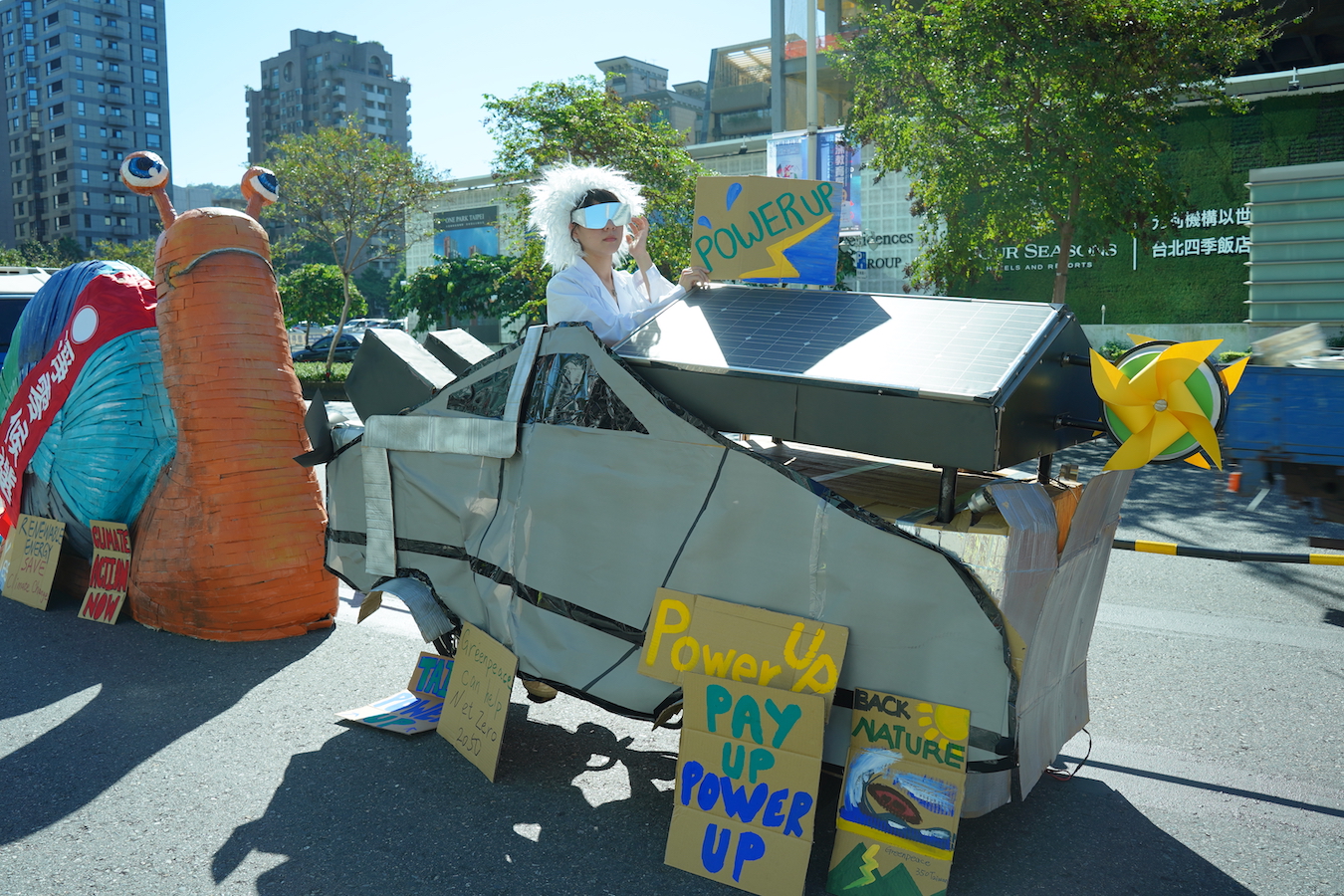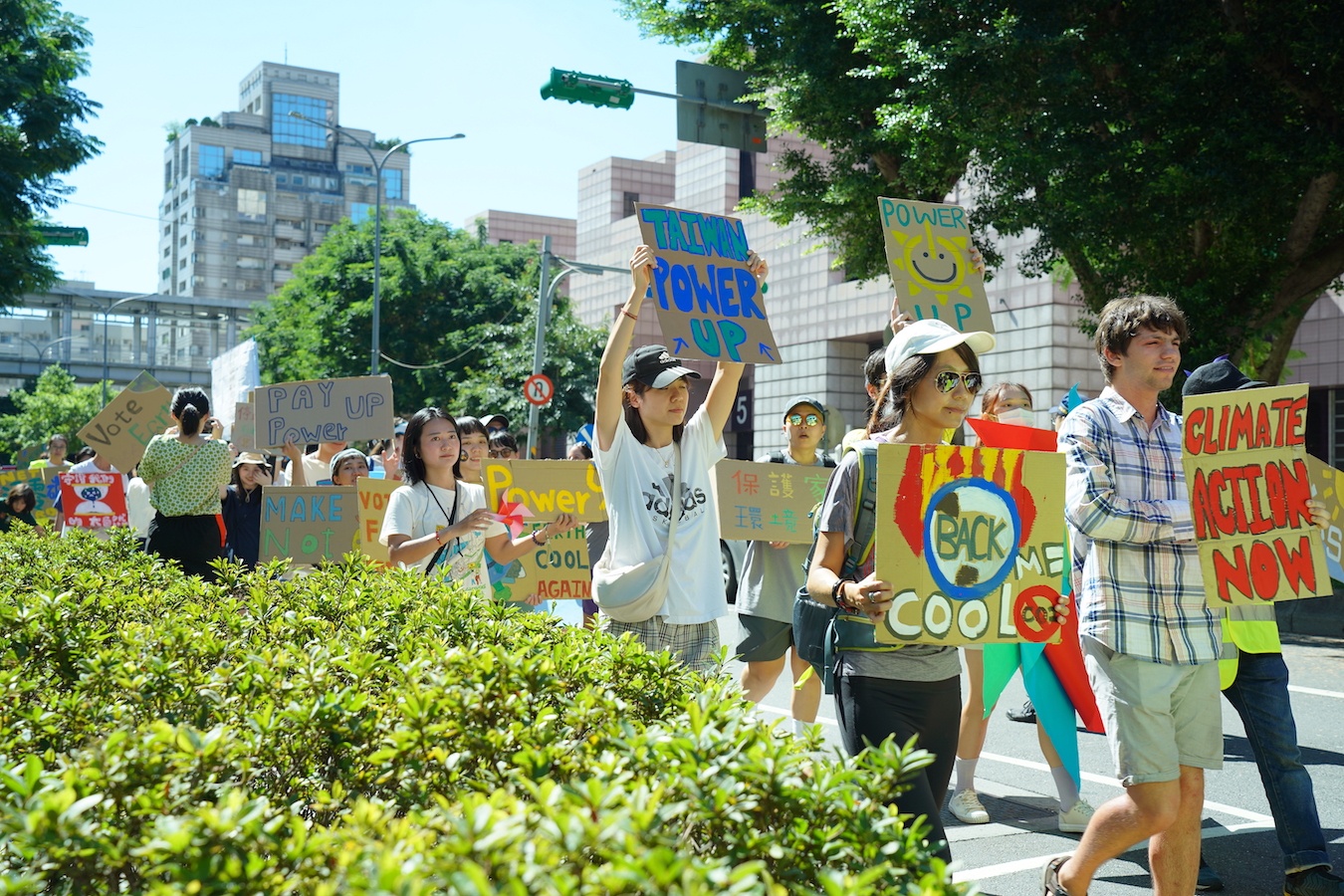by Brian Hioe
語言:
English
Photo Courtesy of 350.org
350.ORG, GREENPEACE, AND other environmental groups demonstrated on Saturday ahead of the upcoming COP28 summit. The demonstration aimed to call attention to the need for climate policy in Taiwan, as well as to meet renewable energy goals.
Over a hundred took place in the demonstration, which was held outside of Taipei 101. In particular, organizers of the demonstration called for greater attention to mid-range goals for reducing carbon emissions by 2030 for Taiwan to meet UN-set goals for net zero emissions by 2050.
The organizers called for reducing carbon emissions by at least 40% by 2030. To achieve this, organizers called for further government subsidies to allow townships and villages to install solar panels and develop wind energy. Roof installations for solar panels were advocated, seeing as clearing forests that already reduce carbon emissions proves counterproductive.
 Photo courtesy of 350.org
Photo courtesy of 350.org
Providing for this would allow for reducing fossil fuels. Nevertheless, organizers criticized the lack of clear goals for achieving such reductions. Organizers also touted the potential economic benefits to Taiwan from transitioning to green energy.
A number of corporate clothing brands sponsored the demonstration, including Norrøna Taiwan, kawas, Patagonia Taiwan, Fjällräven Taiwan, along with sporting brands as Taiwan Dive, Slackline Formosa, Gearlab Outdoors, UP Sports, and Blue Trend.
The demonstration was aimed at pressuring the government ahead of elections. Nevertheless, as with many other political issues in Taiwan, environmental policy has become caught up in partisan contestation between the pan-Blue and pan-Green camps.
Pan-Blue candidates have begun to lean into calls for Taiwan to rely on nuclear energy during its energy transition, with TPP presidential candidate and former Taipei mayor Ko Wen-je now among those to endorse the notion. This takes place in a campaign cycle where pan-Blue independent Terry Gou called for the construction of small-scale nuclear reactors across Taiwan and the idea was subsequently embraced by the KMT candidate Hou You-yi, even if Gou was later criticized for the notion.
The DPP has more recently doubled down on its anti-nuclear stance, with Premier Chen Chien-jen emphasizing the Tsai administration’s view that nuclear is not green energy and that a nuclear-free homeland is still the general consensus of society–even if legal requirements for phasing out nuclear energy by 2025 were voted down by a national referendum in 2018. At the time, the public also voted for lowering the amount of energy produced by thermal power plants by 1% each year.
The view that nuclear energy is not green power reflects the particularity of the nuclear debate in Taiwan. Namely, apart from concerns about the potential for nuclear disaster given Taiwan’s frequent seismic activity, nuclear waste disposal has been a contentious issue in the past. Nuclear waste has, in some cases, been forced onto communities that did not want nuclear waste disposal facilities in the vicinity of their homes. Or communities have been misled about such waste disposal facilities, such as how the Indigenous residents of Lanyu/Orchid Island were originally told that a nuclear waste disposal facility was a canning plant.
 Photo courtesy of 350.org
Photo courtesy of 350.org
Yet the KMT has also taken in recent times to criticizing the DPP over the push for renewable energies, claiming that the DPP is entrusting the fate of Taiwan’s energy mix to untested, new, and undependable forms of energy.
Otherwise, the suggestion is that the DPP is only pushing for green energy because of investments that DPP politicians have in green energy companies. The DPP previously responded to such accusations by pointing to how KMT politicians also have investments in green energy.
Either way, it is to be seen whether Taiwan’s energy transition becomes a significant campaign issue for the 2024 elections. So far, one thinks that this will not be the case, with the significant domestic political issue still being the sluggish economy–with voters potentially punishing the DPP over its inability to turn around Taiwan’s economic outlook.

